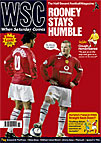 Having made £6 million less from last season's Champions League than the previous year, Manchester United chief executive David Gill yearns for UEFA to revert to the second group stage format for the competition
Having made £6 million less from last season's Champions League than the previous year, Manchester United chief executive David Gill yearns for UEFA to revert to the second group stage format for the competition
There is a never a shortage of opportunities to despair at how the businessmen who run major clubs do not understand the principles of football. David Gill, chief executive of Manchester United, for example, recently declared that he wants to see the return of the second group stage in the Champions League when the current contract ends in 2006. “I think all the big clubs would have preferred to keep it. There was a higher quality of opposition in the second group phase than the first one.” “Higher quality”, of course, means western European teams containing famous players who appear in Nike ads and would fill all the stadiums for three extra group games with tickets at 30-plus quid a throw.
What is preying on David Gill’s mind most is that Man Utd made £6 million less from the tournament last season compared to the year before, but he also claims concern about playing standards and wheels out a lumbering big gun to support his case. “Even UEFA president Lennart Johansson said last season’s final between Porto and Monaco was possibly caused by the impact of the revised format.” It’s not clear how the absence of a second group stage brought about the defensive collapses of AC Milan and Real Madrid in their quarter-final second legs against Deportivo and Monaco, but Mr Gill would surely have found an explanation had he been asked.
The new breed of football money men believe in a natural order set in stone and Gill’s comments (doubtless reflected by his counterparts at the other G-14 clubs) are another example of the notion aired in the summer when Greece became European champions – smaller teams don’t really win tournaments so much as the big teams lose them. Yet in the wake of Brian Clough’s death, it might be recalled that no one said there was anything wrong with the standard of the Football League when Derby and Nottingham Forest were winning it in the 1970s, or of Scotland in the Eighties when Dundee United and Aberdeen seriously challenged Rangers and Celtic.
This is not the first time that officials at United have indicated a preference for playing more matches in the Champions League, in direct contradiction of the views of the manager. Like Arsène Wenger, Sir Alex Ferguson publicly supported the revised Champions League format when it was announced on the basis that his players were being overworked and that there too many group matches with nothing at stake.
The news of United’s fall in income came in the announcement of their end of year accounts up to July 2004, which included information made public for the first time largely due to the demand for greater financial clarity from the influential Irish shareholders John Magnier and JP McManus. The club’s fall in revenue – a 30 per cent downturn in pre-tax profits from the previous year – was exacerbated by the hefty £9m paid to players’ agents in the 12 months in question, since when they have also handed over a further £1.5m to Paul Stretford for whatever it was he contributed to Wayne Rooney’s decision to leave Everton for Old Trafford. Gill defends these payments (Ruud van Nistelrooy’s man pocketed over a million for negotiating a new contract in January) as “a genuine cost of working in this business”. It is to be hoped that such transparency, however much it was forced by behind-the-scenes manoeuvrings, will be copied by other clubs. That agents can take so much money out of football for assisting a player who wants a move or a new contract anyway is another argument for overhauling the current regulatory bodies or replacing them with organisations able to stand up to the free-for-all marketeers.
The G-14’s other ongoing wheeze, of course, is to press at European Union level for compensation from the various football associations when their players are on international duty – compensation that the smaller nations certainly could not afford and, if you want to talk money, that ignores the role of national teams in adding value to the game in the first place.
There are worse than Gill – Malcolm Glazer, for instance. But football has been built up into a globally popular sport through a series of complex relationships, with the World Cup and continental championships an integral part of the mix. Much in the manner of, ooh, Russian businessmen buying up oil rights on the cheap, Gill and the G-14 have eyed up a likely source of profit and, having contributed little or nothing to the game, said: “We’ll take it from here.”
Their shared disregard for the game’s wider values and for getting money for nothing is of course why Gill gets on so well with agents.
From WSC 213 November 2004. What was happening this month